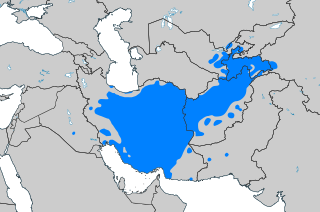Standard Persian (Persian: فارسی معیار) is the standard variety of Persian that is the official language of Iran[5] and Tajikistan[6] and one of the two official languages of Afghanistan.[7] It is a set of spoken and written formal varieties used by the educated persophones of several nations around the world.[8]
| Standard Persian | |
|---|---|
| فارسی معیار | |
| Native to | |
Native speakers | 70 million[3] (110 million total speakers)[4] |
Standard forms | |
| |
| Official status | |
Official language in |
|
| Regulated by |
|
| Language codes | |
| ISO 639-1 | fa |
| ISO 639-2 | per (B) fas (T) |
| ISO 639-3 | fas |
| Glottolog | fars1254 |
| Linguasphere | 58-AAC (Wider Persian) > 58-AAC-c (Central Persian) |
 Areas with significant numbers of people whose first language is Persian (including dialects) | |
As Persian is a pluricentric language, Standard Persian encompasses various linguistic norms (consisting of prescribed usage). Standard Persian practically has three standard varieties with official status in Iran, Afghanistan, and Tajikistan. The standard forms of the three are based on the Tehrani, Kabuli, and Bukharan varieties, respectively.[9][10]
Written standards
editThe Persian alphabet is used for both Farsi (Iranian) and Dari (Afghan). Traditionally, Tajiki is also written with Perso-Arabic script. In order to increase literacy, a Latin alphabet (based on the Common Turkic Alphabet) was introduced in 1917. Later in the late 1930s, the Tajik Soviet Socialist Republic promoted the use of Cyrillic alphabet, which remains the most widely used system today. Attempts to reintroduce the Perso-Arabic script were made.[11]
See also
editReferences
edit- ^ a b c Samadi, Habibeh; Nick Perkins (2012). Martin Ball; David Crystal; Paul Fletcher (eds.). Assessing Grammar: The Languages of Lars. Multilingual Matters. p. 169. ISBN 978-1-84769-637-3.
- ^ "IRAQ". Encyclopædia Iranica. Retrieved 7 November 2014.
- ^ "Persian | Department of Asian Studies". Retrieved 2 January 2019.
There are numerous reasons to study Persian: for one thing, Persian is an important language of the Middle East and Central Asia, spoken by approximately 70 million native speakers and roughly 110 million people worldwide.
- ^ Windfuhr, Gernot (1987). Comrie, Berard (ed.). The World's Major Languages. Oxford: Oxford University Press. pp. 523–546. ISBN 978-0-19-506511-4.
- ^ a b Constitution of the Islamic Republic of Iran: Chapter II, Article 15: "The official language and script of Iran, the lingua franca of its people, is Persian. Official documents, correspondence, and texts, as well as text-books, must be in this language and script. However, the use of regional and tribal languages in the press and mass media, as well as for teaching of their literature in schools, is allowed in addition to Persian."
- ^ "Tajikistan Drops Russian As Official Language". RFE/RL – Rferl.org. 7 October 2009. Archived from the original on 4 March 2016. Retrieved 13 September 2013.
- ^ "What Languages are Spoken in Afghanistan?". 2004. Retrieved June 13, 2012.
Pashto and Dari are the official languages of the state. are – in addition to Pashto and Dari – the third official language in areas where the majority speaks them
- ^ "Standard Persian" (PDF). www.sid.ir. Retrieved 28 October 2020.
- ^ "History of Tehrani accent". Iranian students news agency. Retrieved 28 October 2020.
- ^ "Bukharan Tajik". www.cambridge.org. Retrieved 28 October 2020.
- ^ 'Tajikistan to use Persian alphabet,' Iranian website says. Tajikistan News ASIA-Plus. Published 3 May 2008, retrieved 9 April 2019.